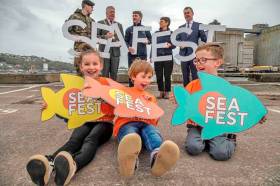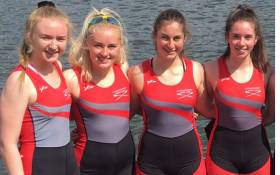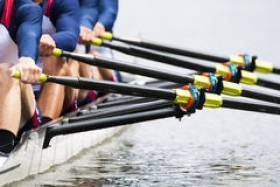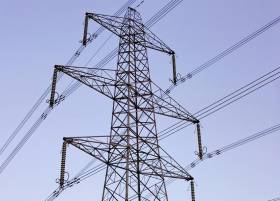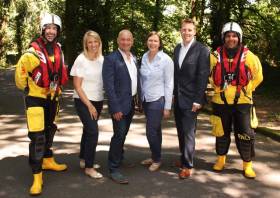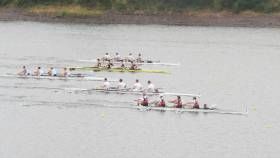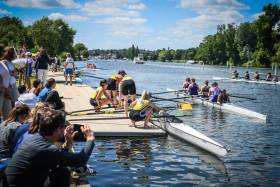Displaying items by tag: Cork
Sea Change At Seafest: Ireland’s Largest Free Maritime Festival To Raise Awareness Of Plastic Pollution
An interactive hut made up of 60kg of household plastics — the average amount used by an adult in Ireland each year — will be unveiled at SeaFest this weekend, highlighting the problem of plastics in our oceans.
Ireland’s largest free family-friendly maritime festival begins at the Port of Cork from today, Friday 7 June, and continues to this Sunday 9 June with over 100 free events celebrating our oceans.
More than 100,000 visitors are expected to attend SeaFest, which is presented by Cork City Council and the Inter-Departmental Marine Coordination Group (MCG).
Raising awareness of the need to protect our marine environment against plastic pollution, Bord Iascaigh Mhara's centrepiece at SeaFest is the Clean Oceans Experience.
Funded by the European Maritime and Fisheries Fund, the installation includes a 60kg plastic hut sculpture, representing the total plastic packaging waste produced per person in a year.
This installation will be accompanied by a specially commissioned artistic performance, Fantastic Fishermen Go Fishing for Litter, on how the fishing sector is reducing plastics in our seas.
Members of the fishing sector taking part in BIM's Fishing for Litter scheme, which encourages fishermen to take ashore waste they encounter at sea, have collected over 330 tonnes of marine litter since it began in 2015.
“Environmental stewardship of our oceans is something we need to instil in our children”
“Environmental stewardship of our oceans is something we need to instil in our children,” Lord Mayor of Cork, Councillor Mick Finn, said. “This will ensure the problems facing our oceans are addressed, and hopefully, reversed.
“I’m delighted to welcome SeaFest to Cork for the next three years, as it serves an important role in this education. SeaFest is a brilliant illustration of our unique and unrivalled maritime history.
“In a fun and interactive way, this national annual festival is helping those of all ages to think about their connection with the water and how the actions they make today can make a difference tomorrow.”
Engaging exhibitions and workshops to turn plastic into art also feature at SeaFest, open daily from 10am to 6pm.
A Flock of Sea Gulls will see 1,000 young visitors transform 1,000 plastic cartons into an installation of seagulls, while the Port of Cork and MaREI’s 3D exhibition, Maintaining a Healthy Harbour, is also on display, with marine litter artworks from local school children.
Showing how our oceans and climate are linked, the Marine Institute’s Wild Atlantic Theatre features talks from Met Éireann’s head of forecasting Evelyn Cusack and wildlife cameraman Doug Allan.
Doug, who has worked alongside Sir David Attenborough on BBC’s Blue Planet and Frozen Planet, will discuss how changing climate is affecting Earth's north and south regions.
Sustainably sourced Irish seafood plays a starring role at SeaFest
Sustainably sourced Irish seafood plays a starring role at SeaFest with demos from top chefs Nevin Maguire, Rory O'Connell and Martin Shanahan.
The Bord Bia and BIM Seafood Experience also features fishmongers Pat O’Connell and Hal Dawson on seafood preparation.
Encouraging responsible activity on the water, SeaFest will hold free sailing, kayaking, and currach boats sessions, along with interactive displays exploring the marine world.
Speaking ahead of SeaFest 2019, Marine Minister Michael Creed said: “SeaFest is part of Harnessing Our Ocean Wealth, the Government’s integrated plan for the marine sector. A key aspect of this plan is to significantly increase our level of engagement with the sea.
“As we welcome the festival back to Cork from Galway where it has been thriving over the past three years, once again, SeaFest has delivered a fantastic line-up of free, educational and fun events to engage both the public and policy makers alike and emphasise the importance of Ireland’s marine economy.”
Providing education on our oceans, the Marine Institute's RV Celtic Explorer is open to the public, following its oceanographic data collection voyage from Galway to Cork.
There will also be vessel tours of Commissioners of Irish Lights’ ILV Granuaile and tall ship Phoenix.
MFV Allanah Riley, a white fish trawler that fishes out of the port of Castletownbere, will be open to visitors throughout SeaFest. Its crew will be on hand to explain the sustainable fishing practices of the Irish fishing fleet.
Market traders will be using compostable packaging across the weekend
As part of Cork City Council’s commitment to green initiatives, Cork City Council environmental awareness officer Mary Walsh highlighted that market traders will be using compostable packaging across the weekend.
“There will also be pirates on site, keeping SeaFest free from single-use plastics. If someone has brought a plastic bottle with them, the pirate will show them how, and where, to dispose of it,” she said.
SeaFest 2019 is a culmination of a weeklong celebration of Ireland’s rich maritime heritage, as the annual Cork Harbour Festival runs until Sunday 9 June.
The Our Ocean Wealth Summit takes place in Cork on Sunday 9 and Monday 10 June. The summit will hear from global leaders including environmental activist and former US Secretary of State John Kerry.
To view the full festival programme visit SeaFest.ie. Follow SeaFest on Facebook, Twitter and Instagram and use the hashtag #SeaFest19.
SeaFest is proudly supported by Cork City Council, BIM, Marine Institute, Port of Cork, Cork Harbour Festival, Commissioners of Irish Lights, Defence Forces, Department of Agriculture, Food and the Marine, Department of Foreign Affairs and Trade, Bord Bia, Sea Fisheries Protection Authority, Pure Cork and by media partners Today FM and RedFM.
Seafest is co-funded by the Government of Ireland and the European Union under Ireland’s European Maritime & Fisheries Fund Operational Programme for the seafood sector.
Carlow and Castleconnell Notch Up Wins at Ghent
#Rowing: Carlow’s Sadhbh Scully and Keara Egan won the junior 18 women’s double at Ghent regatta on Sunday – first of 18 competing crews. Castleconnell won the women’s junior 18 quadruple, another competitive event, with 10 crews completing the course. Both clubs did well over the two days, as did Three Castles, Methodist College, Belfast, Cork and Commercial, whose senior men’s eight took second on the Sunday.
Ghent Spring Regatta, Belgium (Selected Results; Irish interest):
Saturday
Men
Sculling, Quadruple: 3 Lagan Scullers. Junior: 5 Three Castles.
Double – Jun: 3 Three Castles (L Flynn, A Keogh)
Single – Jun: 5 Cork (P Beechinor) 7:41.32.
Women
Eight – Junior: 1 Commercial 7:25.17.
Four – Jun: 1 Castleconnell 7:32.0, 2 Commercial 7:37.27.
Pair - Senior: 2 Anna Liffey (C Dempsey, D Maguire). Under-23: Cork (J Duggan, C O’Sullivan) 8:11.24. Junior: 1 Cork (J Duggan, C O’Sullivan) 7:59.94, 2 Castleconnell (L O’Brien, N Kiely) 8:04.33.
Sculling
Double – Junior: 5 Carlow.
Lightweight Single: 2 Skibbereen (O Hayes). Under-23: 1 Carlow (K Egan) 8:49.25. Junior: 6 Carlow (S Scully).
Sunday
Men
Eight – Senior: 2 Commercial. Four, coxed- Jun 18: 2 Methodist College, Belfast. Junior 16: 2 Castleconnell.
Sculling, Quadruple: 2 Three Castles.
Double – Jun 18: 4 Cork (Beechinor, M Cronin) 7:08.14.
Single – Under-23 Lightweight: 2 Castleconnell (B Frohburg). Jun 18: 3 Three Castles (Flynn), 5 Three Castles (Tiarnan McKnight), 6 Three Castles (Keogh).
Women
Four – Jun: 1 Commercial 7:41.73, 2 Castleconnell.
Pair – Sen: 3 Anna Liffey (Dempsey, Maguire). Under-23: Cork (Duggan, O’Sullivan) 8:47.59. Jun: Cork (Duggan, O’Sullivan) 8:12.36, 3 Commercial.
Sculling, Quadruple – Jun 18: 1 Castleconnell 7:21.72. Jun 16: 3 Castleconnell, 4 Carlow.
Double – Jun 18: 1 Carlow (Scully, Egan) 7:58.26.
Single – Lightweight: 2 Skibbereen (Hayes). Lwt U-23: 1 Carlow (Egan) 8:56.71. Jun 18: 3 Carlow (Scully); 5 Cork (H Gahan).
Commercial Senior Eight Resist Strong UCD Challenge
#Rowing: Commercial beat UCD and Cork Boat Club to take the men's eights at Skibbereen Grand League Regatta at the National Rowing Centre today. Commercial seemed to be in a commanding lead coming up to the viewing area, but UCD chased them down and were under two seconds behind at the finish, with Cork not much further back.
The women's eights went, as expected, to UCC, while Holly Davis, who is just 14, won the Division Two single sculls by a huge margin.
Dublin to Host First of Corporate Regatta Series
#Rowing: Dublin City Council and Waterways Ireland have backed a new Corporate Regatta in Dublin, the first of a planned series.
The Rowing Ireland event will be held on May 10th in the Docklands. Crews from companies will compete, with the aim of encouraging team spirit. A learn-to-row session, lunch and a drinks and awards presentation are part of the deal.
The next stage of the series is set to be held in Cork in October.
A North Cork sailor recently reunited with the people who saved his life after he was electrocuted while moving his sailboat.
As Echo Live reports, it’s now a year since Noel Moloney was hit with a 10,000-volt electric shock when the mast from his boat connected with overhead power lines as he was moving it out of a field behind his home.
Noel’s family immediately sprang into action, with his son Shane pulling him away from the boat by his clothing, while his wife Debbie was assisted by neighbours in giving him CPR.
Noel was finally revived with a defibrillator by first responders — and he took the opportunity to thank them and everyone else who had a hand in bringing him back as part of the Big Push to Save Lives campaign.
The campaign will see emergency personnel in North Cork push an ambulance for a marathon distance around Mallow’s Cork Racecourse this April, in aid of first responder schemes in Ballyclough, Liscarrol and the Mallow area.
Echo Live has more on the story HERE.
Cork Lifeboat Lunch Returns To Raise Vital Funds For The RNLI
#RNLI - The hugely successful Cork RNLI charity lunch and auction is set to return after an absence of five years.
The revamped fundraiser for Baltimore, Crosshaven and Kinsale’s RNLI lifeboat stations will take place in the 18th century mansion now home to the Maryborough Hotel in Douglas on Friday 5 October.
Cork has a long and proud association with the RNLI which goes back generations. The men and women who volunteer as lifeboat crew come from local communities and give hours of their time and dedication to the charity.
From the rescue of the Rambler crew by Baltimore RNLI during the Fastnet Race, to rescues of fishermen, divers, swimmers and boaters, the lifeboats and their crew provide an invaluable service.
Last year the Baltimore, Crosshaven and Kinsale RNLI lifeboat stations launched 86 times and brought 116 people to safety. Not every callout is life and death, but to the people involved in every mission, the lifeboats are their lifeline in times of trouble on the water.
The lunch and auction will get underway at 12.30pm with guests welcomed in the Orangery to the accompaniment of live music from Conor Ocean. This will be followed by a three-course lunch in the Sherrard Suite at 1.30pm.
Master of ceremonies Alan Shortt will provide the entertainment and lead the post-lunch auction and draw. The event will finish at 4pm.
RNLI fundraising committee members Avril O’Brien and David Doherty are looking forward to what promises to be an event to remember.
“We are delighted to reintroduce the RNLI lunch and auction,” Avril said. “It was always a popular occasion and as well as raising vital funds it became a highly anticipated social and networking event.
“Volunteer lifeboat crew give so much to the RNLI in terms of their time and dedication to the service and they need to be supported with the best in kit and equipment. Every person who buys a ticket to the fundraiser or bids on an auction item will have the knowledge that they are helping save lives at sea.”
Tickets priced at €65 are now on sale online via Eventbrite and will be sold in tables of 10. For more information about the event contact RNLI Munster community fundraising manager Mary Creedon at [email protected]
Cork Clubs Come to Fore at Irish Rowing Championships
#Rowing: UCC brought their title tally to three as they added the club coxed four to their club eights and intermediate single sculls pots at the Irish Rowing Championships today. The four was tested by four other crews coming to the line but broke free and won. The morning session on the Sunday was held in intermittent light rain.
Margaret Cremen won the women’s lightweight single sculls. The Lee woman looked dominant through much of the race, but as she approached the line she was hunted down by Orla Hayes of Skibbereen, who closed to just a few seconds on the line. Hayes’s clubmate, Aodhan Burns, left no doubts as to his intentions in the men’s lightweight single. He left the rest behind and won well.
The men’s intermediate pair gave Shandon a chance to demonstrate the depth of their talent pool. Stephen O’Sullivan and Colm Hennessy teamed up to win. The Castleconnell junior double of James Desmond and Rory O’Neill came under pressure from Lee in their win.
One of the closest races in the Championships so far came in the women’s intermediate four. Leaders Trinity were pipped on the line by Cork, whose winning margin was under a third of a second (.312).
Killorglin’s Anna Tyther and Rhiannon O’Donoghue gave Fermoy a test in the women’s junior pair. Gill McGirr and Eliza O’Reilly are an excellent crew, however, and held off their Kerry rivals.
Irish Rowing Championships, Day Three (Selected Results)
Men
Four – Club, coxed: UCC A 6:38.03.
Pair – Inter: Shandon A 6:56.07.
Sculling, Double – Junior: Castleconnell (R O’Neill, J Desmond) 6:49.97.
Lightweight Single: Skibbereen (A Burns) 7:20.56.
Women
Four – Inter, coxed: Cork 7:22.36.
Pair – Junior: Fermoy (E O’Reilly, G McGirr) 7:48.69.
Sculling, Lightweight Single: 1 Lee (M Cremen) 8:06.97.
Championship Records Tumble at National Rowing Centre
#Rowing: Records fell in race after race in the final Saturday session of the Irish Championships. The Skibbereen senior quadruple of Fintan McCarthy, Aodhan Burns, Kealan Mannix and Jake McCarthy smashed the Championship best of 5:59.10 as they won in 5:50.696.
The Shandon junior quadruple of Eoin Gaffney, Luke Hayes-Nally, Jack Dorney and Alex Byrne – all set to compete at the World Junior Championships – set a new time of 5:58.26. This beat the old Championship record of 6:07.97.
In both cases the crews were bettering times set by their own club.
Lisa Dilleen’s win in the women’s senior single scull was emphatic. The Cork Boat Club sculler set a Championship course record of 7:34.282, bettering Monika Dukarska’s time of 7:35.07.
Ronan Byrne of UCC took the intermediate single, under some pressure from Niall Beggan of Commercial. Byrne’s time of 6:55.898 bettered Kealan Mannix’s time of 7:03.51, set last year.
Enniskillen took the women’s junior eights, in 6:30.753, bettering their own time from last year of 6:36.24.
In the women’s senior pair, Aine McCarthy and Niamh Casey shattered the old Championship record of 7:23.78, setting a new time of 7:17.176.
Joan Poh of Neptune also won the club single sculls in a new record. The old figure was 8:09.22. Poh won in 8:06.13.
UCD continued their fine run in eights by adding the men’s novice title to the intermediate one.
Irish Championships, Day Two (Selected Results)
Men
Eight – Inter: UCD 5:43.70. Novice: UCD 6:03.599.
Four – Junior, coxed: Enniskillen 6:22.66.
Sculling, Quadruple – Senior: Skibbereen 5:50.696. Jun: 1 Shandon 5:58.26
Single – Inter: UCC (R Byrne) 6:55.898. Club: Carlow (F O’Driscoll) 7:25.3.
Women
Eight – Novice: Queen’s 7:04.49. Jun: Enniskillen 6:30.75.
Pair – Senior: Skibbereen 7:17.18.
Sculling, Double – Inter: Skibbereen 7:09.09. Single – Senior: Cork BC (L Dilleen) 7:34.28. Club: Neptune (J Poh) 8:06.1. Jun: Coleraine GS (M Curry) 7:53.46.
#Rowing: Skibbereen won three of the four Division One titles on offer in the first session of finals at Cork Regattat at the National Rowing Centre. However, the final of the men’s pair belonged to David O’Malley and Shane Mulvaney of UCD. They raced well in the hot weather and finished well clear of Skibbereen’s Shane O’Driscoll and Mark O’Donovan.
Gary O’Donovan followed his brother Paul O’Donovan over the line in the men’s single sculls, while Denise Walsh got the better of Cork’s Lisa Dilleen in the women’s single.
The women’s pair was won by Aine McCarthy and Niamh Casey of Skibbereen.
Cork Regatta, National Rowing Centre (Selected Results)
Men
Eight – Div Two: Neptune (club two) 6:22.95; 4 Trinity (nov) 6:34.32; 5 Col Iognaid (jun 16) 6:35.63; 6 Shandon (jun 18B) 6:43.79.
Pair – Div One: 1 UCD (S Mulvaney, D O’Malley; sen) 6:53.31, 2 Skibbereen (M O’Donovan, S O’Driscoll; sen) 6:59.98, 3 Enniskillen (jun 18A) 7:06.75; 6 Cork A (inter) 7:23.68. B Final: 6 Neptune A (club one) 7:24.50.
Single Sculls: 1 Skibbereen (P O’Donovan; sen) 6:59.73. B Final: UCC (H Sutton; lwt) 7:20.63. C Final: 1 Shandon (E Gaffney; jun 18A) 7:28.92; 2 Queen’s (N Hull; inter) 7:29.86
Women
Pair – Div One: 1 Skibbereen (A McCarthy, N Casey; sen) 7:49.73; 4 Col Iognaid (Jun 18A) 8:07.86; Shandon (club one) 8:08.78. C Final: 4 Shandon (inter) 8:36.00.
Sculling, Quadruple – Div Two: 1 Cork A (club two) 7:50.05; 3 Carlow (jun 16) 8:03.97. B Final: Carlow (jun 18B) 8:13.43; 4 Queen’s (nov) 8:25.47.
#Rowing: Two NUIG crews made it through time trials on the first day of Henley Women’s Regatta and will compete on Saturday. In the Championship Eight, NUIG will take on Yale University (scheduled for 2.40), while the Development Coxed Four have been drawn to take on Aberdeen C at 2.04. Tribesmen were allowed only to compete in the time trial of the Championship Eight.
Three Irish crews made their exits: UCD’s eight, the four from Queen’s University and Cork’s Boat Club’s Championship Double. Commercial’s Championship Lightweight Pair have a bye into the semi-final and go into action first on Sunday (10.20).
Henley Women’s Regatta (Irish interest)
Friday
Championship Eight: NUIG made it through Time Trial.
Aspirational Academic Eight: Bath Univ/Bristol Univ bt UCD, 2 ½ l.
Aspirational Academic Four: Exeter Univ bt Queen’s A, nro
Development Coxed Four: NUIG made it through Time Trial.
Championship Doubles: Leander bt Cork A (C Deasy, J Rigothi) 4 ½ l.


























